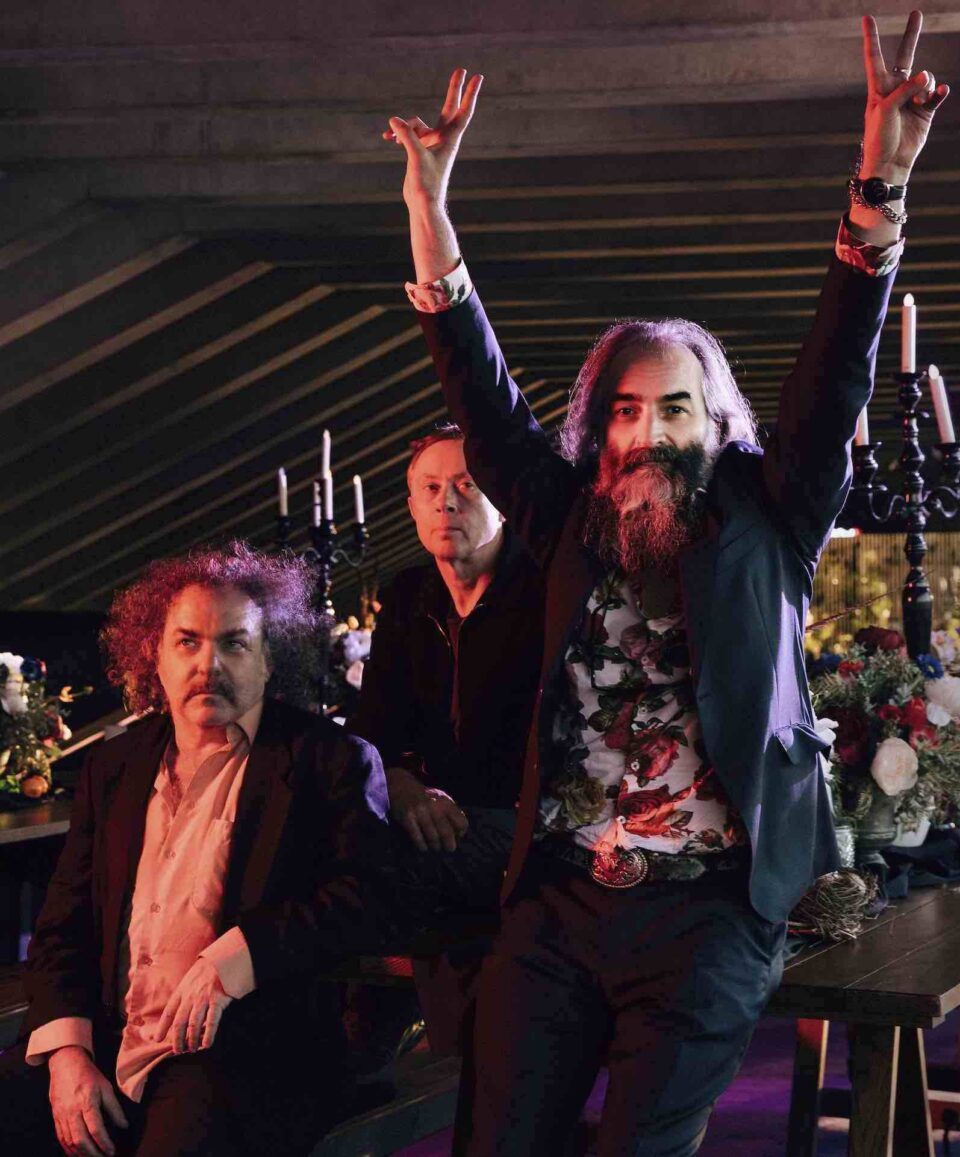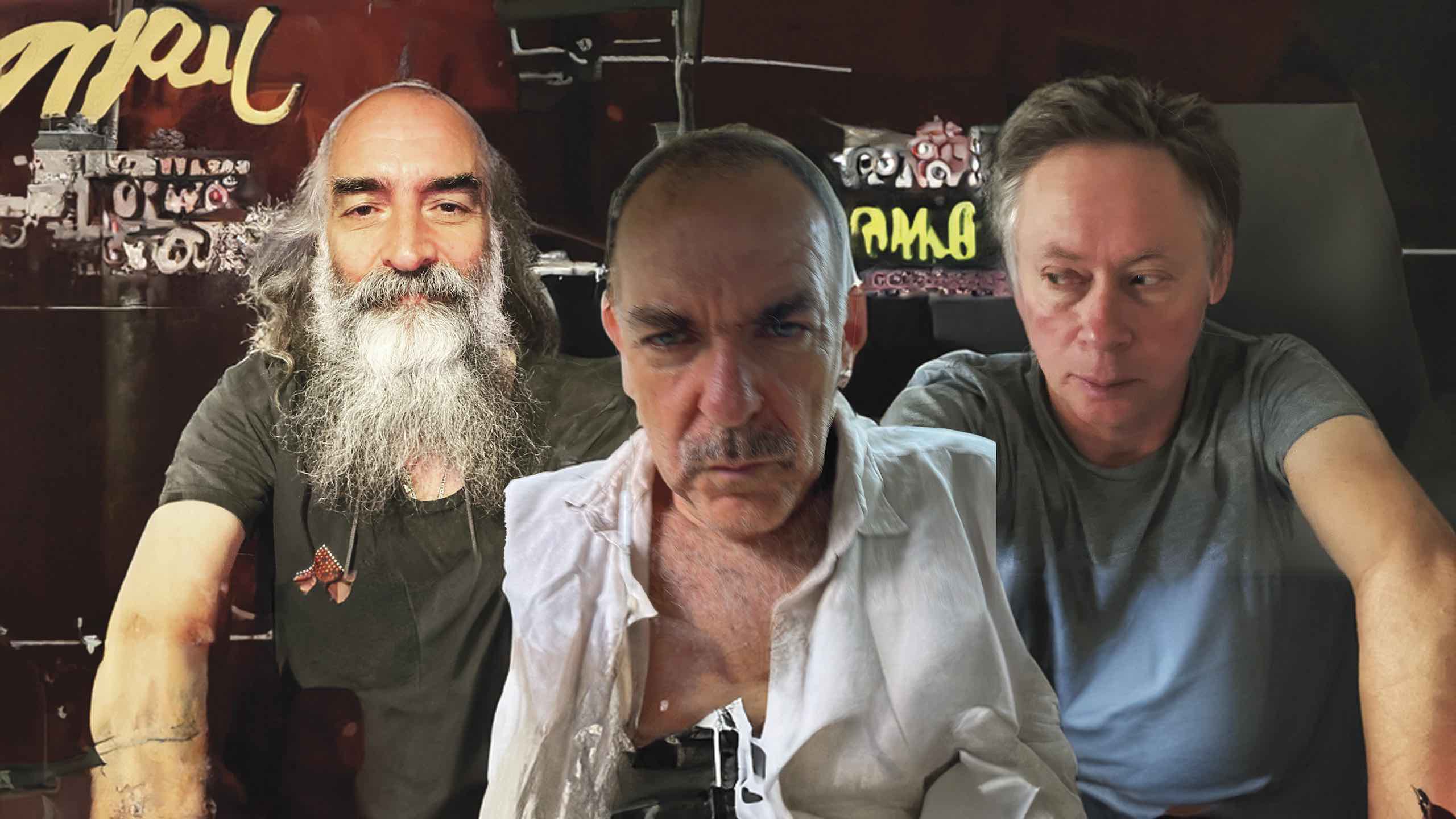Three decades since their eponymous debut, and 12 years since their last album, the Melbourne-forged instrumental outfit Dirty Three has discovered stunningly fresh and beautifully melodic ways into their usual craggy tangle with their new album Love Changes Everything. Inside its electric web of fibrous textures and mossy gardens, violinist/bassist Warren Ellis, guitarist Mick Turner, and drummer Jim White roam freely, poetically, and in unison through the album’s six extended breaths (calling them “songs” doesn’t say enough about what transpires here). The warmly symphonic blues of “I,” the skittering rhythm of “II,” and the epic entirety of the trio’s eleventh studio album shows that little has changed for the democracy of free drama, freneticism, and calm that’s been Dirty Three since its start in 1992.
Loud, soft, violent, peaceful, maximal, and minimal, there’s always something about Dirty Three’s music that holds a gravitational pull—a vortex-sucking sound that comes from their union. “That’s why we’re the Dirty Three, dude,” says Ellis. “What else could you feel from a bunch of people who you’ve known for a long time, where the conversation is easy and you always feel as if you’ve picked up where you’ve left off, you’re interested in what each other is doing, and learn something new each time you get together?” Though no one leads the autonomous trio, it’s clearly the ebullient Ellis who’s the biggest talker. During our pre-rehearsal interview, he’s also the quickest to agree to my take on the album’s blues vibe (“You should write our press releases”) and disagree with my questions and estimations (“If you’ve ever tried to understand a relationship from the beginning, assessing something that’s instinctive rather than analytic, you’d see how difficult questions about our relationship to each other might be”).
Dirty Three didn’t come together in the ’90s Melbourne music scene by accident. White and Turner shared many a band rhythm section in the 1980s and found each other’s intuitive instrumental abilities exciting. “Even at the time, it was all about emotion and feeling—if you were feeling good about something, you proceeded,” says Ellis. “I’m rather an unreliable narrator, but recall that we all shared a curiosity—and share that to this day. Our getting together wasn’t an accident. Once we formed, we kept coming back. And we’ll keep coming back until we’re the Dirty Two. And I hope that they don’t get another violin player.”
Being a band without a singer meant that the trio wasn’t held to the convention of lyric-driven storytelling, vocals, or traditional song forms. “We were improvisational, but our songs are recognizable,” says Ellis. “We need structure, but one we could move away from. We’re curious about dynamics, about where we could take this.” As each member had a large listening diet from the start, Ellis begins rattling off some of Dirty Three’s initial influences in Elvin Jones, Rahsaan Roland Kirk, and the “wild liberation” of The Velvet Underground. Mention the free-jazz inspiration of the Coltranes and a question remains: why isn’t Dirty Three closer to being an avant-garde jazz band? “Freedom isn’t ever the domain of the jazz world,” says Ellis, pointing out his love of Lana Del Rey and Bruce Springsteen, as well. “I’ve played classical pieces as free as the wind.”
There’s a greater voice to instrumental music that allows Ellis, Turner, and White something beyond mere freedom—Dirty Three has been boundless from the start. Turner recalls a vibrant Melbourne arts scene of the late-1980s and ’90s with so many of his comrades playing in multiple bands, doing multiple styles of music: “There was an automatic ease between us, especially playing with Ellis and his distortion pedals and violin pick-ups from a guitar his brother gave him.” For his part, White notes that he “was in five different bands, all cross-pollinating. Before Dirty Three, you were always in bands where you had to rehearse all the time, and learn all the songs. With Dirty Three, we hardly rehearsed at all. We just showed up—take a few basic ideas, experiment, flesh them out with mop buckets and space belts. It was fun.”
“I’ve played music forever, with a lot of people, and sometimes it just clicks,” says Turner. “Our level of communication clicked in very early on and I don’t know why.”
“We haven’t fucked it up yet,” White adds. “We found our own sound early on, and that’s given us freedom to try different things. It’s an effort to find your way forward.”
“Once we formed, we kept coming back. And we’ll keep coming back until we’re the Dirty Two. And I hope that they don’t get another violin player.” — Warren Ellis
Talking about feeling insecure in the world of music—a fear he still holds, despite his multitude of film soundtracks and Nick Cave collaborations—Ellis believes that not everything has automatically come together for Dirty Three sessions. “There are many times when we couldn’t communicate,” he says, mentioning in brief a spell of writer’s block at the start of Toward the Low Sun. “The longevity of Dirty Three, however, is that we have enough respect for the band to step away when we must. The fact that we’re still around, [that’s] probably our greatest achievement.” When Ellis plugs in, he’s enthralled with everything he hears. “It’s so enjoyable. Whenever I hear that sound, it’s like ‘Thank fuck, there that is.’ The sound of 30 years. It’s like time-traveling. I feel all of the moments that we shared. It’s a continuing story, a dialogue. It’s not all beer and Skittles. You’ve talked to bands who’ve had everything thrown at them: glasses and Mars Bars. You go on and do it. It’s life.”
Defining what the nature of their 30-year dialogue is has many tentacles. For Ellis, the new album is a summation, something that the trio couldn’t have made in the beginning—or even the middle of their career together. “The first few [albums] were just our live set that we brought to the studio,” says the violinist. “This record, now, is about getting into a groove, about the 30 years that we’ve been together and not been together, doing different things—which is also important in feeding into what Dirty Three does. Me being with Nick [Cave] is really important to me to find my better self, and to Dirty Three. Same with Mick’s paintings and so many other things that Jim does.”
1998’s Ocean Songs, the first album of material that Dirty Three hadn’t played live before its recording, found the trio moving from music that was “very loud” to moments of quiet. “That was a big challenge,” recalls Ellis, quick to bring up the album’s producer, the late Steve Albini.
“I’ve played music forever, with a lot of people, and sometimes it just clicks. Our level of communication clicked in very early on and I don’t know why.” — Mick Turner

White recalls bringing brushes to the tables for Ocean Song, and that the entirety of that album “embraced radical change.” “We had four days to record, and I remember being horrified that we’d made a big mistake. We thought it sounded terrible. Our first thought was to go back in and turn the amps up to 10 and bash them out. Then Steve stepped in and said something that I live by to this day, something that showed that he understood, and knew how to give us strong advice to achieve our goals. ‘You came in here and told me that you wanted to make a quiet record. I have to confess that I was disappointed—I thought we were going to make the greatest rock record since Raw Power. Now, this is your record, you had a good idea. Don’t forget what you came here to do.’ Steve knew that we were in an uncomfortable zone, but that we had an idea and should honor that. I revert to those words whenever I’m in the weeds.”
Discussing the writing process from Ocean Songs through to Love Changes Everything, Ellis says that it always takes the whole of Dirty Three’s membership to bring a song to where it must go—a “shared process” whose breakdown doesn’t present a complete picture. “I will fight for an idea if I believe in my gut and in my heart that it’s right. I’ll fight for it until somebody grabs me by the throat. I’ll find ways to make it work. When you’re confident, there’s no risk-taking. I function better when I’m feeling vulnerable—whether I’m writing film scores, working with Dirty Three, or writing my book. That was 5 percent enjoyment, 95 percent sheer hell. You’re better off being up to your knees in mud than at peace.”
“[In the beginning] we hardly rehearsed at all. We just showed up—take a few basic ideas, experiment, flesh them out with mop buckets and space belts. It was fun.” — Jim White
Mention that Dirty Three hasn’t made an album together for 12 years, and each member states that time and distance mean absolutely nothing to their proximity. “In the scheme of things, a year or two doesn’t matter—a decade goes by in the blink of an eye once you hit 60,” Ellis laughs. “At that point, you become more aware of how little is left.” Picking up the threads of conversation that is Love Changes Everything, the trio gathered old ideas together and moved away from their usual strengths and into the greater risk of this new record. “It feels to me like a record we could’ve only made now, at this stage,” says Ellis. “It required trust—especially as it was culled from four days of recording, with pieces cut out from a lengthy jam and sculpted into shape.”
In this regard, Love Changes Everything is reminiscent of the relationship between Miles Davis and producer-editor Teo Macero, who fashioned collage-like works such as In a Silent Way and Bitches Brew. “After a few days, if the material is strong enough and fights for its existence, it reveals what it is,” says Ellis. “After we finished, the album revealed what it wanted to be. That gave us the green light, that this was a record that we wanted to put out. We couldn’t have done that at the start. And now, sitting down and playing the stuff from Love Changes Everything, it’s taking different shape. This is really the most exciting part of the whole process.”
Though Ellis finds any breakdown of Dirty Three’s music disrespectful to the end result, the trio is overjoyed to hear what listeners, old and new to D3, bring to the process of Love Changes Everything without being told what to think. “We need more mystery, more moments where the imagination is required without its answers being handed to us,” says Ellis. “I’m all for preserving that sacred moment of discovery, of making our music your own.” FL







